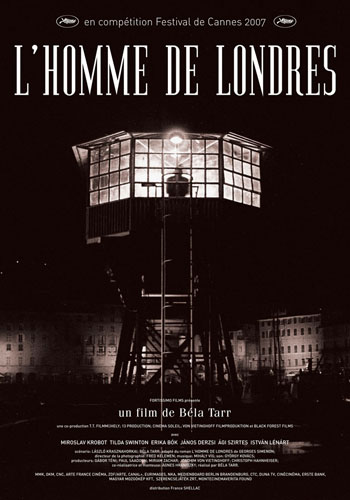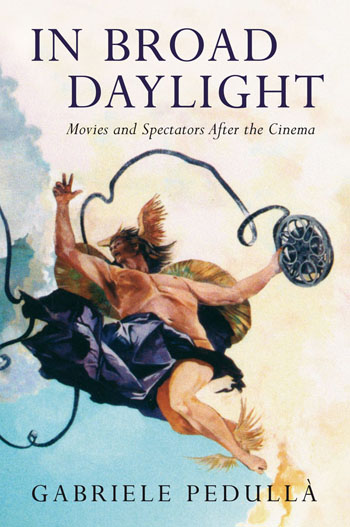In a piece for Idiom, Max Nelson writes that Hollis Frampton’s Gloria! (1979) “was the last completed component of an intended 36-hour-long film cycle inspired by the travels of Magellan, whose literal attempt to ‘encompass all human experience,’ as Frampton once put it, corresponded to the director’s own compulsion to leave no subject unfilmed, no technique untried, no medium unexplored. The film found Frampton looking forward in multiple senses: eagerly adopting new technology (digital interfaces; computer-generated text) and frankly anticipating his own death.”
For more on Frampton, see Ed Halter‘s essay that accompanies Criterion’s collection, A Hollis Frampton Odyssey.
More reading. “What I am calling ‘vulgar appropriationism’ is this,” writes Steven Shaviro: “the way in which pop/commercial media today often appropriate formal structures from more-or-less ‘high art,’ or even avant-garde art, of the 20th century, and use them in ways that negates the aesthetic or conceptual radicality of those structures.”
“Where exactly can one draw clear lines between narrative and excess?” asks Peter Labuza. “If excess is defined when a cinematic element no longer serves a purpose for the narrative, what purpose does it serve?” Peter follows this essay on his “core beliefs about the possibilities of cinema, cinephilia, post-60s film theory, digital indexicality, and more” with a quicker entry on the opening shot of Béla Tarr‘s The Man from London (2007).
Jonathan Rosenbaum has posted his 1977 review of J. Dudley Andrew’s The Major Film Theories.
Peter Bogdanovich opens up another box of notecards he kept on the films by Raoul Walsh that he saw between 1952 and 1970.
Cinematographer John Bailey‘s got a few great stories to tell about John Ford.
Also via Movie City News, the Toronto Star‘s Peter Howell has taken notes on the lengthy Q&A’s Leos Carax has given during the TIFF retrospective, notes on the persistence of cinema (“It’s always trying to reinvent itself”), working with Denis Lavant, his references to other films, and the reactions he’s had to Holy Motors.
In Broad Daylight: Movies and Spectators After the Cinema is a book that won’t leave Wheeler Winston Dixon alone. He’s written a second review, this one for Film International. “In short, the more that [Gabriele] Pedullà keeps arguing that the cinema is dead to theatrical spectators, the more the medium itself fights back… And yet, there is truth to Pedullà’s repeated—and the book as a whole is often repetitive—assertion that what we call a ‘movie’ is undergoing a radical transformation in both form and content.”
Olive Films’ release of Betty Boop: Essential Collection Vol. 1 has prompted Dave Kehr to look back in the New York Times on the Fleischer Brothers’ character who always “seems unaware of the erotic spell she casts on the anthropomorphic world around her.”
“Will James Franco please stop?” begs Los Angeles Times book critic David L. Ulin.
In other news. Vanessa Thorpe reports that Mark Kermode will become the new film critic for the Observer when Philip French retires.
Students enrolled at the Maharishi University of Management can go for a David Lynch MA in Film. Via Rhys Tranter.
New York. Wayne Koestenbaum has a new book out, My 1980s & Other Essays, and you can spend an evening with him tomorrow. Light Industry‘s posted his program notes: Start with Judy Garland…. End with Susan Sontag, or Warhol’s two screen tests of her elliptical allure.”
Los Angeles. Werner Herzog’s installation Hearsay of the Soul is on view at the Getty through January 19, and for Special Affects, Jordan Schonig argues that it “should be given our sincere attention, less as a celebrated artistic debut than as a window into the mind of an enigmatic filmmaker.” Meantime, we carry on updating our entry on “Herzog Season.”
Chicago. Tonight’s screening of Ulzana’s Raid (1972) is the occasion for a terrific piece on Robert Aldrich from the Reader‘s Ben Sachs.
In the works. “Rio de Janeiro’s mayor says he’ll pay ‘whatever it takes’ to get Woody Allen to set one of his films in the seaside city,” reports the Guardian‘s Catherine Shoard.
Joseph Kosinski (TRON: Legacy, Oblivion) will direct the new Twilight Zone movie. At Movies.com, Peter Hall‘s looking on the bright side.
Listening. Catherine Grant gathers links to “Film and Media Studies Podcasts Galore!”
Obit. “I have just learned of the death today of legendary Italian film producer Luciano Martino, the brother of director Sergio Martino, at the age of 80,” writes Tim Lucas. “Simply put, the Golden Age of Italian Fantasy would have been no more than an aberration without his financial support and encouragement of this man.”
Updated entries. Wong Kar-wai and Satyajit Ray.
More browsing? Check in with the cinetrix and the Film Doctor.
For news and tips throughout the day every day, follow @KeyframeDaily on Twitter and/or the RSS feed. Get Keyframe Daily in your inbox by signing in at fandor.com/daily.







